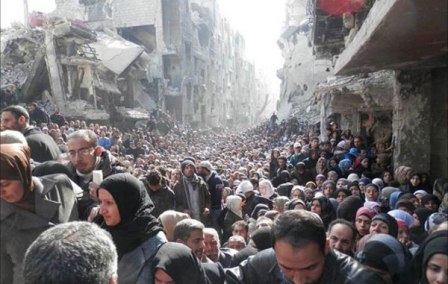In the Search for Peace and Place: The Tragedy of the Palestinian Refugees from Syria

The events of the bloody conflict in Syria have led to the displacement of 9 million people since 2011, including 2.5 million refugees in neighboring countries registered with the United Nations High Commissioner for Refugees (UNHCR), as well as the 6.5 displaced inside the Syrian border. The impact of the conflict is more serious for vulnerable groups, including the Palestinian refugees from Syria, who face human suffering and precarious legal status, the disruption of livelihoods, the loss of security and even their lives, as well as the difficulty of access to humanitarian aid to the Palestinian camps.
UNRWA has announced that 90% of Palestinian refugees in Syria—an estimated half a million—suffer from this tragic humanitarian situation. UNRWA since has suspended its services in the Palestinian refugee camps in Syria under the pretext that it unsafe areas. Some 20 thousand Palestinian refugees remain trapped inside the Yarmouk Refugee Camp, which used to house one-third (140 thousand) of the Palestinians in Syria.
The 80 thousand Palestinian refugees who fled outside Syria suffer arbitrary and militant actions by the governments of the neighboring countries, where 11 thousand refugees face discriminatory procedures by the Jordanian government distinct from Syrian refugees. For instance, Syrian refugees are allowed to stay and travel freely in Jordan after they undergo a security test and find a guarantor, while the Palestinian refugees more likely face detention and deportation. Lebanon has begun to exercise restrictive and undeclared policies Palestinian refugees from Syria, whose number is estimated at about 51 thousand. UNRWA announced last May that the Lebanese government had refused to allow the Palestinians displaced from Syria to enter its territory, despite confirmation from Beirut of no such official policy.
The Palestinian refugees who are in areas outside the scope of the work of UNRWA often find themselves in tragic legal situations, where they lack international protection, although registered with UNRWA. Egypt hosts some 6,000 Palestinian refugees, but the UN High Commissioner for Refugees (UNHCR) has refused to registered them, because they are registered with another international agency, and the 1951 Refugee Convention does not apply to Palestinian refugees.
Their state of statelessness of makes Palestinians one of the most vulnerable groups in the Middle East region, having suffered from repeating the process of displacement for the second or third time. Amid political unrest in the host countries, Palestinian refugees have faced expulsion and detention in both Libya and Tunisia in the years 2011–2012.
In October 2013, more than 200 Palestinian refugees from Syria, out of 375, have drowned, after being exposed to fire and sinking of the boat they were traveling in, most of them from the Yarmouk refugee camp.
However, for those heading westward, Turkey is only a stepping-stone for thousands who risk the treacherous journey westward to Europe. Besides the life-threatening hazards of crossing overland and by sea, they find themselves in a further precarious status under the law. Among European countries, only Sweden has acknowledged its obligation as a state to offer asylum to Palestinian refugees, among others, coming from Syria. Together with Germany, Sweden is the EU country which has accepted the highest number of asylum seekers from the war-torn country. However, a long and treacherous path across Europe lies ahead for those seeking a safe and legal refuge.
|